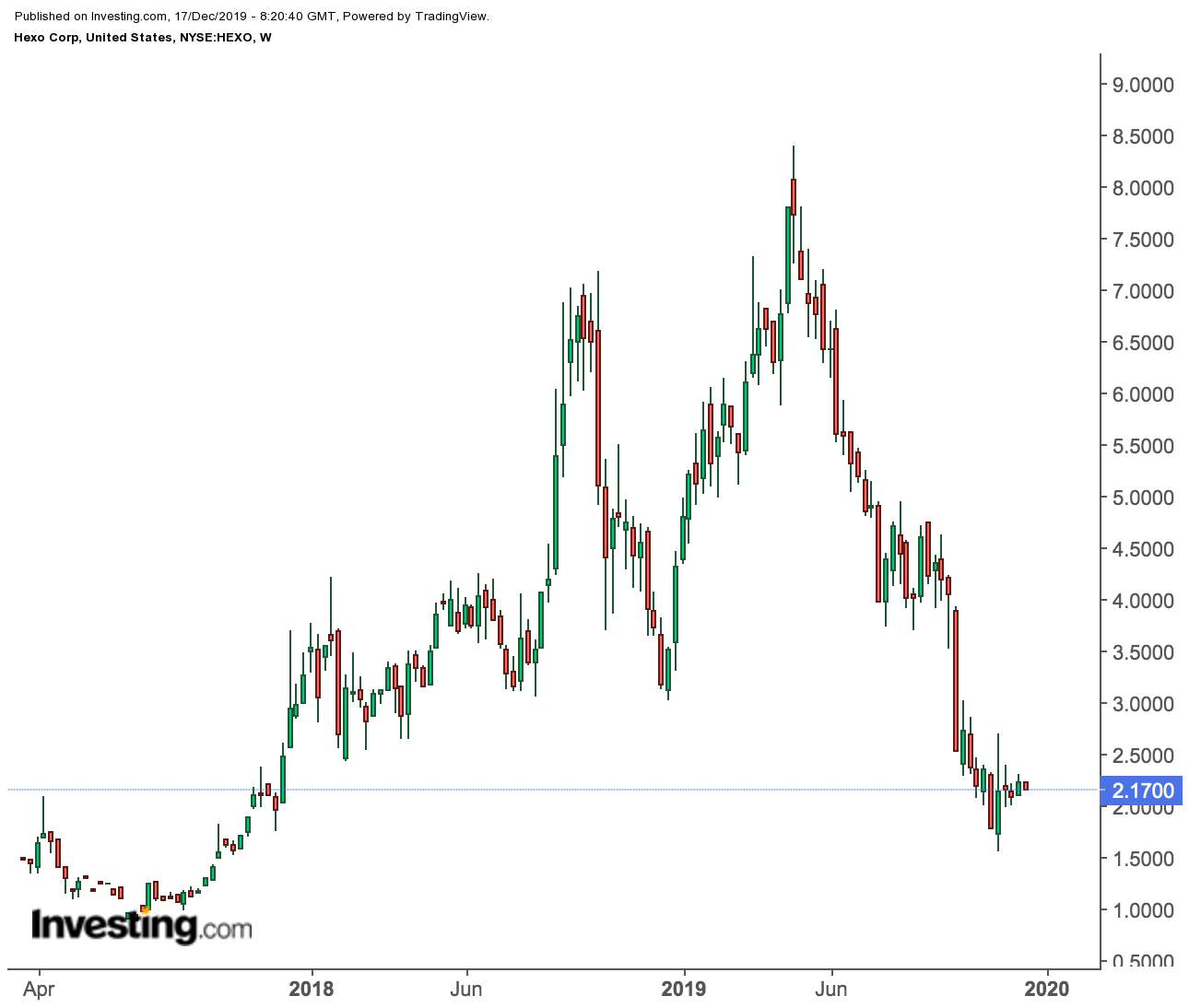If cannabis investors were looking for a Christmas miracle in the form of a sign that pointed to a turnaround in the sector, they did not get it from Hexo (NYSE:HEXO), (TSX:HEXO) yesterday as the Quebec-based marijuana grower reported its first quarter results for the 2020 financial year.
Hexo’s stock price took a more than 3% drop on the day, hitting US$2.17 (C$2.85) on news that the company recorded a C$62.4-million (US$ 47.4-million) loss in the three-month period that ended Oct. 31. The downward effect on the stock appeared to have dragged others in the sector down with it, as Aphria (NYSE:APHA), (TSX:APHA) and Aurora Cannabis (NYSE:ACB), (TSX:ACB) also saw their stock prices take a blow.

The overall losses were a substantial increase over the C$12.8-million (US$9.72-milion) loss posted in the same period the previous year. It was even more than the previous quarter, which registered a C$56.7-million (US$ 43.06-million) deficit.
The disappointments included in Hexo’s latest financials reached across the board, from net revenues and expansion plans to operating costs.
Net revenues were down, coming in at C$14.5 million (US$11.012 million) compared with C$15.4 million (US$11.698 million) the previous quarter. Net revenues from the first quarter of financial 2019 was C$5.7 million (US$4.33 million). Although Hexo sold more cannabis in the last quarter, the weaker revenue was attributed to substantially lower prices.
There was no specific reference made to when and how Hexo planned to enter the U.S. market.
And even news of sharp cuts to expenditure—such as the 25% drop in operating costs, which fell to C$35.1 million (US$26.66 million) from C$46.9 million (US$35.62 million) the previous quarter—failed to rise to the threshold of good news as part of the decrease in costs was due to staffing cuts, which triggered C$3.7 million (US$2.81 million) in restructuring expenditures to cover “severance and other payroll-related termination costs.”
It is also worth noting that despite lowering operational costs, they are still at a level more than double net revenues.
Adding to the bad news were reports by analysts with RBC Capital Markets that predicted, in their view, Hexo’s path to a positive EBITDA in 2020 is not entirely clear.
If there was any other hope that Hexo was looking to reverse its fortunes with the release of the so-called 2.0 derivative products—the edibles, vapes and topicals—the company signaled it was pausing slightly on this front. It plans only to ramp up the release of these products toward the middle and latter half of the fiscal year, well behind other players like Canopy Growth (NYSE:CGC), (TSX:WEED).
First Week Of Legal Weed Sales In Michigan Shows Promise
Federally legalizing cannabis in the U.S. is widely accepted as the one move that would be the biggest game-changer for the industry on both sides of the border. An indicator of just how big the impact would be came last week, as the first figures were released in the wake of the Great Lakes State move to legalization.
The first week of legal sales in Michigan, from Dec. 1-8, saw US$1.6 million (C$2.1 million) in recreational marijuana sold, according to a report in the Detroit Free Press.
Those figures were racked up in only five retail shops, three of which sold out or had limited supplies, according to the report.
State officials have estimated that once fully established, annual sales will hit US$949 million (C$1.3 billion), generating a total tax revenue from state and excise taxes of US$151.9 million (C$200 million).
Michigan has a population of just under 10 million, making it the tenth most populous state in the U.S.
Canadian University To Offer Course On Cannabis Cultivation
A little over a year ago Canada became the first G7 country to legalize cannabis nationally. Now, one of the country’s top universities is about to offer its first diploma in cannabis cultivation.
Earlier this month McGill University in Montreal announced it will begin offering a Diploma in Commercial Cannabis to meet the growing demand from the expanding cannabis growing industry in the country for trained biologists. The course will be offered through the university’s agriculture faculty with the aim of training individuals who already hold a bachelor’s degree in biology, agriculture or environmental sciences. All candidates will have to pass a criminal background check and obtain security clearance from the federal government. And the cost for the one-year program will be C$24,000 (US$18,220).
The dean of the university’s faculty of agriculture and environmental sciences, Anja Geitmann, said she has been contacted by stakeholders in the industry throughout the past year. The industry is desperate to hire individuals knowledgeable about plant sciences. The course now will offer biologists a specialization in cultivating cannabis, which will also equip them to design new strains, protect the plants from contaminants as well as understand the legal framework the industry must operate within.
Guelph University in Ontario, which also has a large faculty of agriculture, offers a college level cannabis cultivation course.
